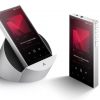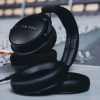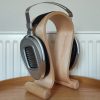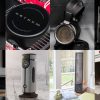One of the fascinating things about the audio industry are the companies that exist in the shadows manufacturing products for a wide range of manufacturers. Most audiophiles have probably never heard of Oddict, but there’s a decent probability that you’ve used something manufactured by their parent company.
The Oddict Twig Pro TWS Earbuds could have been branded for another manufacturer but its parent company has decided to branch out; a comparable scenario would be the Hana brand of phono cartridges manufactured by Japanese OEM, Excel Sound Corporation.

Oddict is a subsidiary of Cresyn, a Korean OEM that started in 1959 and spent its first 25 years making phono cartridges before adding headphones, earphones, and audio drivers in the 1980s for a number of large manufacturers in the industry.
More recently, Cresyn began selling some of its product line under two house brands that it controls.
The first of those brands was Phiaton, and the second is Oddict.

The Twig and Twig Pro are the two first products offered with the Oddict branding and they are already doing quite well overseas.
The other reason I was interested in trying out the new Twig Pro is Snapdragon Sound; Qualcomm’s latest generation Bluetooth audio controller which supports aptX adaptive. Bluetooth aptX is capable of supporting 16-bit/44.1kHz lossless audio if everything in the chain has the same capabilities.
There are rumors that 24/96 support is a possibility if all of the components will support it but that has not been confirmed.
How is this possible?

Some of the reason for this, is a blending of Wi-Fi and Bluetooth; a detailed explanation of this can be found on Qualcomm’s page as well as more details on lossless streaming here (pdf).
So far, the number of products incorporating this new generation chip is fairly small but it is growing, and the Twig Pro is among the products that currently carry the Snapdragon Sound badge.
Qualcomm is careful not to name the competitors in the table below; our bet is that they are Samsung Scalable, HWA LHDC, AAC, and Sony’s LDAC.

So with the Oddict Twig Pro representing a new offering from a well established OEM with a new chipset from a leader in the Bluetooth audio market, this seemed like a good opportunity to try something that few N. American publications have reviewed so far.
The original Twig won a RedDot Award for Design Innovation which added to its credibility.

The Not So Skinny
The Oddict Twig Pro is in some ways, a typical stick type earpiece as the name implies, but it does so with more style than most.
The case is a small disk roughly 2 inches in diameter and slightly less than an inch thick with a metal plate on the bottom and a black thermoplastic body. The body has a wasp waist which makes it easy to grip and gives a unique look with a USB Type-C port, control button and LED indicator on rear surface opposite the charging bay.

The charging case has a gull-wing type mechanism to expose the charging bays. The battery in the case provides one full charge and a part of a second before needing to be plugged in.
From completely discharged, the case takes roughly 2 hours to recharge. Two full charges gives users 13 hours of playing time.
The earpieces consist of the stick and bulb design with the stick portion matching the gunmetal plate on the bottom of the case and the bulbs the matte black of the top portion of the case.
The stick portion is not touch sensitive but instead has a large button on the rear surface that handles the controls and mics placed on the top and bottom of the stick for ANC and phone calls.
The bulb portion holds a 12mm dual layer dynamic driver with a carbon paper diaphragm. The nominal impedance is listed as 32 ohms with a sensitivity of 130dB/mW.
The tips use a smaller than standard diameter shaft so tip rolling is slightly more difficult but I found the new Spinfit CP360 designed for TWS earbuds to fit well.

The earpieces fit comfortably in the ear and I was able to create an excellent seal once I sorted out the right size tip. With their medium size and positioning outside the ear canal, the Twig Pro should be an easy fit for all but the smallest ears.
Once inserted, it took fairly vigorous shaking of the head to dislodge them and they should have no issues staying in place under most normal usage. The earpieces are IPX4 rated which will make them suitable for the gym (sweat) but I would not submerge these.
Pairing went smoothly with both Android and iOS devices and while the Oddict app does facilitate easier control of some of the features, it isn’t required to use the Twig Pro earbuds.
Sound
The base signature of the Twig Pro is a fairly shallow “V” with a sub-bass emphasis that drops back fairly quickly in the mid bass, with another rise in the upper midrange that forms a plateau with the treble up through about the 9kHz range where it drops back some before finally rolling off around 14kHz.

The bass has more than adequate extension and impact; the mid bass is strong and well defined with above average speed for a wireless earbud.
The midrange is very clean sounding with strong detail; Goltermann’s “Cello Concerto No. 4 in G Major” was delivered with excellent transparency and presence. I was impressed with how it handled strings across a variety of classical tracks.
Acoustic tracks were presented with a rather even tonal balance; the Twig Pro isn’t an overly warm sounding pair of earbuds but there’s more than enough to give notes some added weight.
Male vocals had a nice sense of presence and had zero issues cutting through the instrumentation; female vocals were more forward overall due to the emphasis in the upper midrange.
Cymbals had sufficient detail and bite without ever becoming too aggressive or strident sounding.
There is a peak around 8.5kHz that needs a little EQ as it can give tracks that lean toward harshness that little push over the edge, but others may find that the extra energy here helps tracks sound more lively and airy.



The soundstage is rather intimate sounding; which is fairly standard for a closed back IEM with ANC.
The ANC does impact the sound quality: the Oddict Twig Pro loses some of its clarity in the midrange and I found that the treble became some veiled with it enabled.
The app is not as polished looking as some of the other models in the category, but it did provide a solid amount of EQ control which enabled me to boost what was lost using the earbuds with ANC turned on.

Conclusion
The wireless headphone market is going to be a $27B category within 5 years; the TWS segment is the most competitive right now as consumers are looking for the best possible mix of sound quality, microphone performance, and battery life. Toss in the importance of ANC for business travelers and commuters and you have to be a lot better than average to make a dent.
Oddict’s parent company has already proven that it can make solid TWS models for other brands so I’m not overly surprised that their first two Oddict branded wireless IEMs are quite good. Perhaps even better than many of the more popular models in the category.
The Oddict Twig Pro offer a lot of features, a comfortable fit, and a more neutral sounding tonal balance and presentation than many of its competitors; if you’re looking for a pair of TWS earbuds that are not too extended in either direction and easier to listen to for longer listening sessions — these are definitely worth the money and a listen.
Where to buy: $129.99 at Amazon.
































